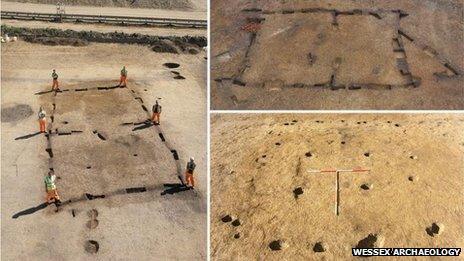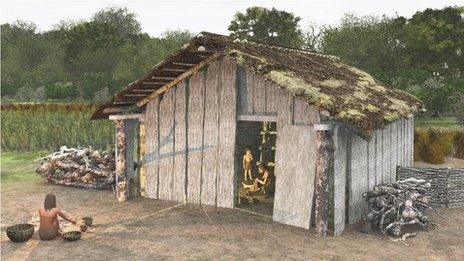Kingsmead Quarry dig unearths Neolithic settlement
- Published

Wessex Archaeology has been excavating at Kingsmead Quarry since 2003
Four Neolithic houses found in a Berkshire quarry are thought to make up one of the oldest permanent settlements ever found in England.
Archaeologists unearthed the 5,700-year-old foundations at Kingsmead Quarry, near Windsor.
The site is from a time when the people of Britain were switching lifestyles from hunter-gathers to settled farmers.
Researchers said it was the first time more than one house from this time had been found on a single site in England.
Dr Alistair Barclay, of Wessex Archaeology, which has been excavating on the site for 10 years, said: "Unfortunately only the ground plans have survived as any timber would have rotted away long ago.
"However, we have a good idea of what these structures may have looked like from the many house finds in Ireland, from experimental work reconstructing prehistoric buildings, and from wood working techniques from timber-built walkways of the same date.
"These finds add to our knowledge of life in Neolithic times and how buildings at that date were constructed."
He added that the discovery provided a unique opportunity to learn more about the earliest permanent settlements in prehistoric Britain and how such sites developed at a time when new practices were being adopted.
Charred food remains
Dr Barclay said excavations were still ongoing and there could be more houses within the settlement that have not yet been discovered.
All four houses were rectangular in shape, with the largest being 15m by 7m, (50ft by 23ft) and situated close to the River Colne.
Two were constructed out of upright oak planks set into foundation trenches, while the others were built using wooden posts.

Finds from the site indicate that the inhabitants were settled farmers
Pottery, flint tools, arrowheads, rubbing stones for grinding corn and charred food remains, including cereal and hazelnut shell, were recovered from the buildings, indicating the inhabitants were farmers.
Radiocarbon results for one of the houses showed it dated from between 3,800 and 3,640 BC.
Further tests are being carried out on the other houses but they are thought to date from the same period.
The excavations are part of Cemex's £4m archaeological programme on the quarry site.
Andy Spencer, sustainability director of Cemex, said: "As well as getting valuable building materials from the land that go into construction projects, quarrying has given us some wonderful archaeological finds that tell us more about our ancestors and how they lived.
"At Kingsmead, the scope of the finds covers thousands of years and has provoked some probing questions about the people who lived there."